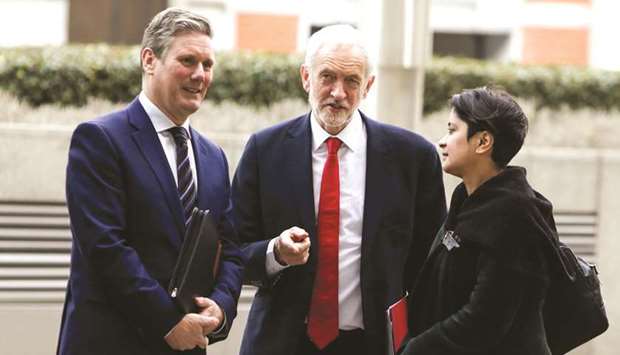Jeremy Corbyn has sought to heal divisions in his fractured party by insisting that a second referendum is central to Labour’s agenda.
Following meetings with senior EU officials in Brussels, the Labour leader called for the prime minister to back a customs union in order to build a Commons majority for the Brexit deal.
He told reporters that his discussions with EU officials confirmed that Labour’s proposals, which include having a say in the bloc’s trade policy, were “credible”.
But Corbyn insisted that the option of holding a second referendum, should May fail to back a close economic partnership with the EU, remained “very much part of the agenda put forward by the Labour party”.
The seven former Labour MPs who split from the party on Monday to form the Independent Group in the Commons all back a second referendum, and have attacked Corbyn for his perceived “betrayal” over Europe.
Corbyn had proposed last month for the Commons to vote on two options – its alternative Brexit plan and whether to legislate “to hold a public vote on a deal”.
Speaking in Brussels, he said that the option of a second vote would remain key to Labour’s strategy for next Wednesday, when the Commons is set to vote again on the Brexit options.
“We will put a motion to parliament, as I have already,” Corbyn said. “Keir Starmer and I have put a motion to parliament, which included the option of a popular vote to confirm otherwise agreements that have been reached. That was rejected by parliament at that stage. Clearly it is very much part of the agenda put forward by the Labour party.”
Labour is currently internally debating an amendment proposed by Labour MPs Peter Kyle and Phil Wilson under which the party would back May’s current deal on the condition it was put to the public for approval in a second referendum.
Corbyn, who also met Jean-Claude Juncker’s most senior aide, Martin Selmayr, during his day in Brussels, made his comments shortly after the commission president said he was not optimistic about the chances of avoiding a no-deal Brexit.
Juncker, who held talks with Theresa May on Wednesday night, said: “If ‘no deal’ were to happen, and I cannot exclude this, this would have terrible economic and social consequences in Britain and on the continent, so my efforts are oriented in a way that the worst can be avoided. But I am not very optimistic when it comes to this issue. Because in the British parliament every time they are voting, there is a majority against something, there is no majority in favour of something.”
The prime minister had emerged from her talks with Juncker on Wednesday claiming that both sides had agreed to work “at pace” on breaking the impasse over the Irish backstop.
A joint statement suggested the two sides were looking at what legal guarantees could be brokered to reassure MPs that the backstop was temporary.
Corbyn said he feared that the prime minister was “running down the clock” in the negotiations.
“We put forward what we believe to be a credible process which would be to negotiate a customs union with the EU and alignment to ensure market access”, he said. “We are strongly of the belief that these proposals are credible. That has been confirmed by our meetings today. The problem is the prime minister is insisting on her deal which has already been defeated very heavily in Parliament and running down the clock by trying to keep the threat of no deal on the table with all the damage that does.”

Labour leader Jeremy Corbyn arrives at the EU Commission in Brussels for a meeting with EU Brexit negotiator.
